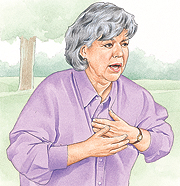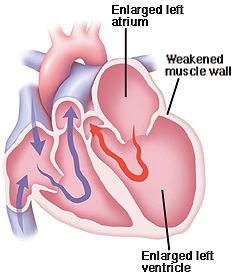What Is Dilated Cardiomyopathy?
If you have cardiomyopathy, you have a problem with the muscle tissue that makes up your heart. Dilated cardiomyopathy is the most common type of cardiomyopathy. It happens when the heart thins and enlarges. As a result, your heart may not be pumping as well as it should. You and your doctor can work together to help your heart.

Symptoms of Dilated Cardiomyopathy
Common symptoms include:
-
Shortness of breath, especially when you exert yourself.
-
Unexplained tiredness.
-
Chest pain.
-
Fluid buildup in the lungs. You may need extra pillows to help you breathe when you lie down.
-
Fluid retention resulting in swollen feet or ankles or unexplained weight gain.
-
Heart skipping beats, fluttering, or thumping.
-
Fainting, dizziness, or lightheadedness.

When You Have Dilated Cardiomyopathy
With dilated cardiomyopathy, the heart muscle has been damaged. A damaged heart muscle cannot move as much blood as before. To try to pump enough blood, the heart muscle stretches so it can hold more. The chambers, especially on the left side of the heart, often dilate (get larger). Larger chambers may help move more blood for a while. But, in time, the stretched-out muscle gets even weaker and tires out.
Treatment for Dilated Cardiomyopathy
Dilated cardiomyopathy doesn't go away. But it can be treated. Treatment can help keep cardiomyopathy from getting worse, and can reduce your symptoms. Treatment can also help prevent heart failure. (Heart failure happens when the heart muscle weakens so much that it can't move enough blood. Fluid then builds up in the lungs and the rest of the body.) Your doctor will work with you to develop a treatment plan to help you feel better now and prevent problems in the future.
Following Your Treatment Plan
Your treatment plan may include:
-
Making lifestyle changes such as balancing activity and rest, quitting smoking, and tracking your weight.
-
Eating less salt, if so instructed. Follow your healthcare provider's advice.
-
Taking medications and having medical treatments.
Be sure to see your doctor regularly. Mention any problems you are having with your treatment plan. Be honest if you are not doing something your doctor has suggested. He or she may be able to make some changes to help your plan work better for you.
ÂÂ
Publication Source: American Heart Association
Publication Source: Cardiomyopathy Association
Online Source: American Heart Association
Online Source: Cardiomyopathy Association
Date Last Reviewed: 2007-09-15T00:00:00-06:00
Date Last Modified: 2005-10-04T00:00:00-06:00
![]() (727) 259-7818
(727) 259-7818